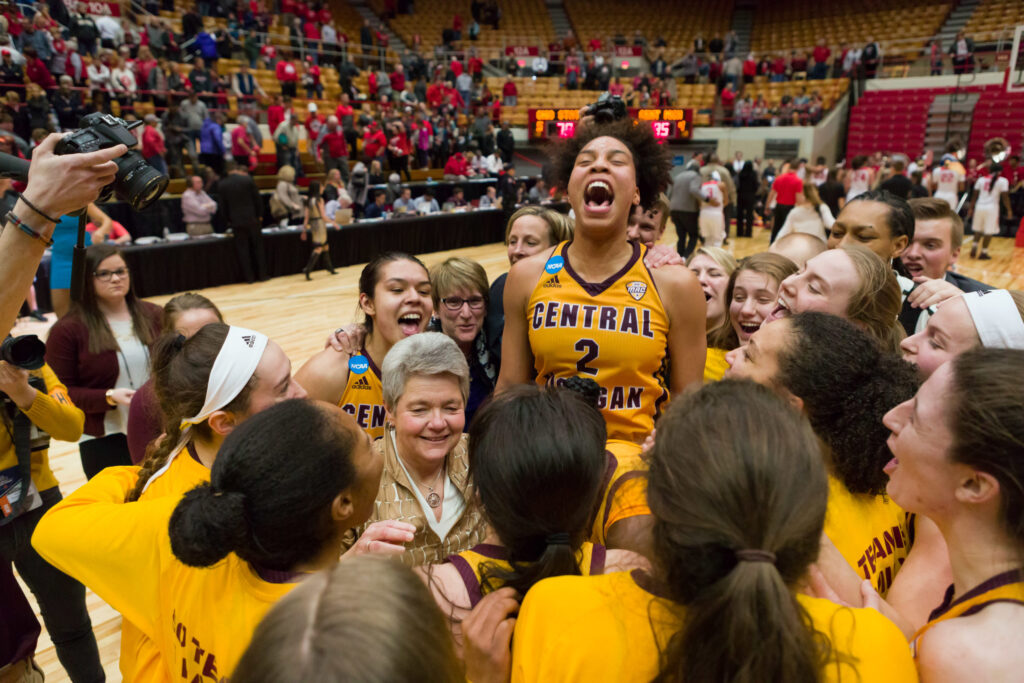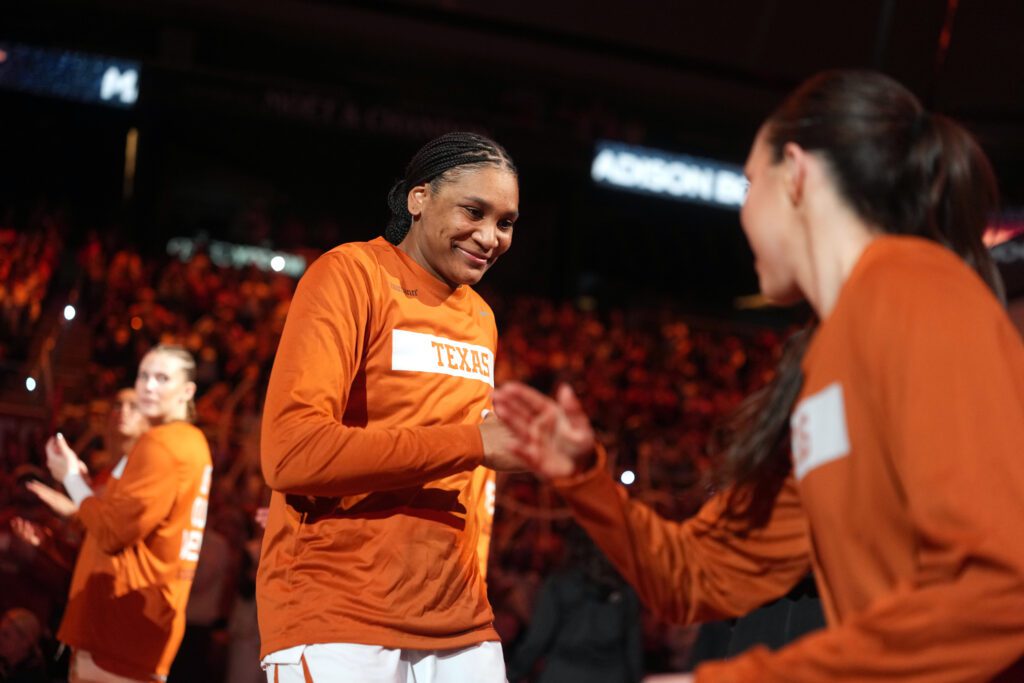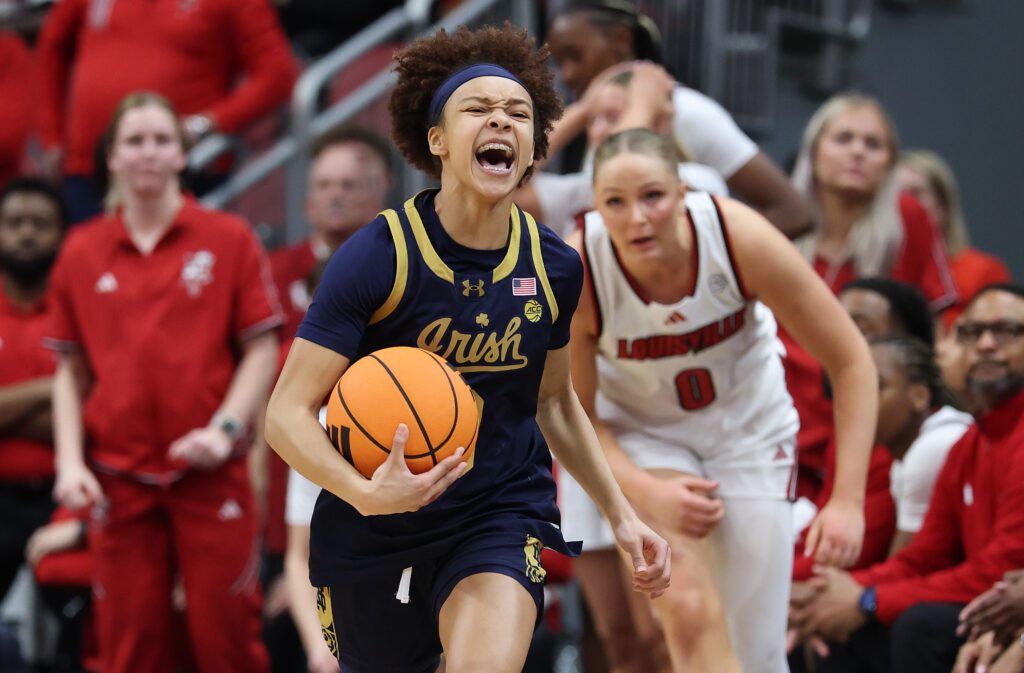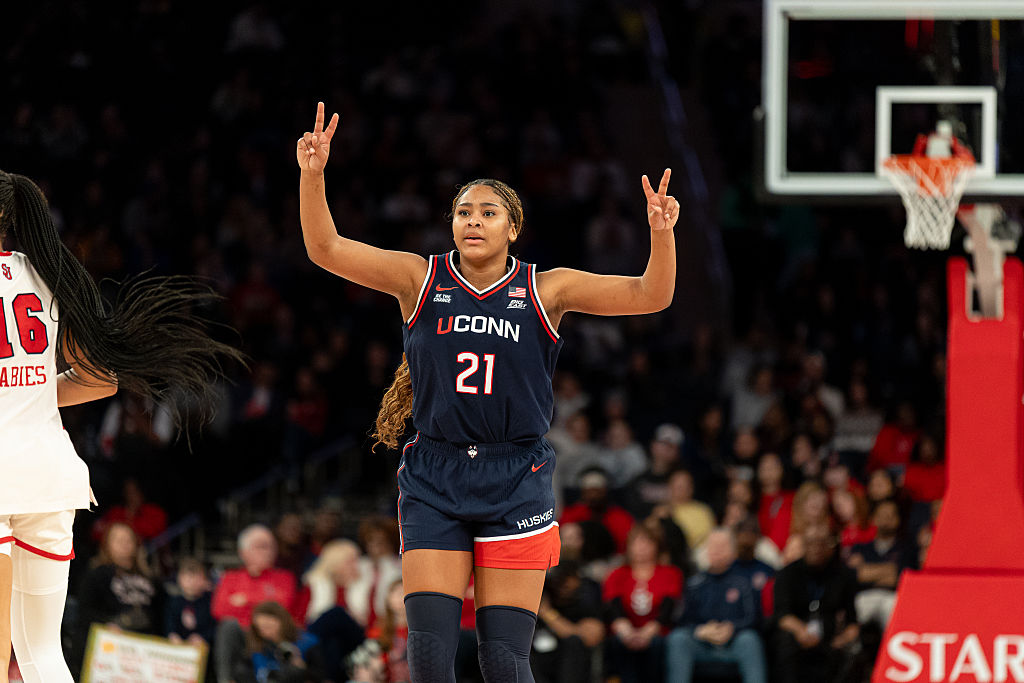No. 10 seed Creighton knocked off No. 2 Iowa in front of a sellout crowd at Carver Arena last Sunday to advance to their first Sweet 16 in program history. That same day, No. 10 South Dakota went down to Waco, Texas and beat two-seed Baylor on their home floor.
Upsets have abounded through the early stages of this year’s NCAA Women’s Tournament, with eight double-digit-seed wins in Rounds 1 and 2 tying the record for the most ever, set in 2018. The madness has brought attention to the growing parity in women’s college basketball. But while most people think of UConn’s historic winning streaks and the dominance of No. 1 seeds in tournaments past, mid-major programs have been setting a competitive bar for years.
“Even this year, looking at some of the seeds these mid-majors get, they’re obviously being called upsets because of seed, but anybody who truly watches these games, some of these are not upsets. There’s a lot of parity there,” said South Dakota State head coach Aaron Johnston, whose team has been to 10 NCAA Tournaments during his tenure and is competing in the NIT Tournament this year.
“It’s up to us to keep getting those wins, to keep scheduling in November and December and proving it and not just talking about it. And I think this year’s been a good example that a lot of teams have really proved that.”
For the past 15 years, individual mid-major programs have been proving it, too. With insight from coaches, we highlight a few of those teams that have made deep NCAA Tournament runs since 2007.
Missouri State, 2019-21
Missouri State has an extensive NCAA Tournament history, with 17 appearances in the last three decades, five trips to the Sweet 16, two to the Elite Eight and two to the Final Four.
In 2019, Missouri State advanced to its fourth Sweet 16 as a No. 11 seed after taking down No. 6 DePaul and No. 3 Iowa State in the first two rounds. Even though the Bears fell to No. 2 Stanford in the Sweet 16, their win over Iowa State was extra sweet given it was their first second-round appearance since 2001.
FEELIN' PRETTY SWEET!!!#MSULadyBears #ncaaW pic.twitter.com/3n29VTjpEa
— MSU Lady Bears (@MSULadyBears) March 24, 2021
Two years later, the Bears did it again, this time as a No. 5 seed after going 16-0 in the Missouri Valley Conference. They defeated No. 12 UC Davis and No. 13 Wright State before No. 1 Stanford, the eventual NCAA champions, beat them again in the Sweet 16.
South Dakota State, 2019
South Dakota State made noise in 2019 when it advanced to the program’s first and only Sweet 16, but the team’s success that year took root a decade earlier. The Jackrabbits set the bar high during their first season as a Division I Summit League program in 2008-09, finishing 34-3 and advancing to the second round of the tournament as a No. 7 seed.
In Johnston’s ninth full year at the helm, South Dakota State beat No. 10 seed TCU before two-seed Baylor ousted them in the second round.
“It’s really not supposed to happen like that,” Johnston said. “Usually it takes quite a bit of build-up and a process and a lot of steps to get to that point. We just kind of took off like a rocket. There were obviously a lot of things that fell into place, but also that experience really set a standard for what we wanted to try and do going forward.”
The Jackrabbits have maintained that standard nearly every year since then, making 10 NCAA Tournament appearances and three trips to the second round.
As Summit League champions, South Dakota State entered the 2019 tournament on an automatic bid but earned a No. 6 seed thanks to the program’s long track record of success, dominance in the conference and strength of schedule. They went on to beat No. 11 Quinnipiac in the first round, setting up a second-round matchup with No. 3 Syracuse.
🧩 Head Coach Aaron Johnston (2000-present): SDSU Women's Basketball
— The Summit League (@thesummitleague) March 11, 2022
A six-time #SummitWBB Coach of the Year, Johnston's Jackrabbits became the first team in league history to reach the NCAA Tournament's Sweet 16 in 2019#ReachTheSummit x #SummitReaches40 pic.twitter.com/ggTjVlto6U
“They remember the disappointment, they remember the feeling of not finishing that game and honestly, they were driven to want to succeed,” Johnston said. “I remember winning the first game against Quinnipiac. It’s hard to win in the tournament, and our team was excited, but that first win didn’t have the same joy you would think it would because they were so focused on wanting to get the second one.”
The Jackrabbits’ skilled perimeter guard play overcame Syracuse’s zone defense in the second round en route to a 75-64 win and a historic trip to the Sweet 16, where they lost to No. 2 Oregon.
Buffalo and Central Michigan, 2018
It was the year of the MAC at the 2018 NCAA Tournament as both Buffalo and Central Michigan advanced to the Sweet 16 for the first time as 11 seeds.
That season, the Chippewas won the MAC regular season and tournament championship (after beating Buffalo 96-91) to earn their fourth NCAA Tournament appearance. They knocked off No. 6 LSU and No. 3 Ohio State before falling to No. 2 Oregon in the Sweet 16. Their overall 30-5 record still stands as one of the most memorable in school history.
Central Michigan's @CoachSueG and the Chippewas will keep on dancing to the Sweet 16! #FireUpChips #MACtion pic.twitter.com/kGVRtgFU1i
— #MACtion (@MACSports) March 20, 2018
“We were not going to be intimidated,” said Sue Guavara, the Central Michigan coach at the time. “We said, ‘You put your shoes on the same way they do. Now, they might have five or six more pairs, but that doesn’t matter. They are just like you.’”
The following season, Central Mighican earned an at-large bid to the NCAA Tournament as an eight seed. Guevara prioritized scheduling tough non-conference games during the regular season not only to prepare her team to win the conference, but also to improve their chances of earning an at-large bid. In 2018-19, the Chippewas played No. 3-ranked Louisville, No. 24-ranked Miami, Tulane, Western Kentucky, South Dakota State, UCF, Virginia, Vanderbilt and Quinnipiac all before taking on a stacked conference slate.
“At-large bids are so tough to get as a mid-major. The RPI of your conference matters, your body of work matters, your strength of schedule has to be high,” said Guevara. “That year, we loaded up as strong of a non-conference schedule as we could. We struggled to get games – nobody wanted to play. I credit Jeff Walz for bringing his team to Mount Pleasant that year.”
In 2021, Central Michigan earned its sixth trip to the big dance as a 12 seed but fell to No. 5 Iowa in the first round.
Buffalo’s route to the 2018 Sweet 16 was a bit different. Up until that point, the Bulls had been to the NCAA Tournament just once in 2016. In 2018, they lost to Central Michigan in the MAC tournament, seemingly ruining any chance they had of going dancing.
Even head coach Felisha Legette-Jack was getting ready to prepare for a WNIT run.
“I told the team we’re just going to watch this in the locker room, just us, and I can’t assure you what’s going to happen,” she said. “We always watched Selection Monday at the time. We had a camera in there just in case, but nobody believed we were going to get in.”
“It was the first segment, and we just lost it. We were like, ‘Are we really in?’ That’s how God works; He didn’t even make us wait long. We were a team that was just on our own. It was an incredible thing to see. We were so blessed.”
Dancing time!!!!!! pic.twitter.com/oMVt3Lsygw
— UB Women's Hoops (@UBwomenshoops) March 12, 2018
The Bulls were awarded their first ever at-large bid as an 11 seed and went on to dominate No. 6 South Florida and No. 3 Florida State behind Cierra Dillard’s 36 and 29 points, respectively. The Bulls eventually fell to No. 2 South Carolina.
“We just knew that our story needed to be told,” said Legette-Jack. “Our story was we do matter, we are worthy of this opportunity, we’ve earned the right to be here. Just let them know our story through this game.”
In 2019, Buffalo entered the tournament as a 10 seed, their highest ever, and beat No. 7 Rutgers to advance to play No. 2 UConn in the second round, where their run ended.
This year, Buffalo fell to No. 4 Tennessee 80-67 in the first round as a 13 seed. The result was a bit of a disappointment for the Bulls given their recent success.
“I’m hoping that we can get to neutral sites because it’s only fair,” said Legette-Jack, whose team played the Vols at their home arena instead of in a previously arranged venue, as the men’s tournament has done for years.
“Our fans couldn’t even sit behind our bench. There were empty seats behind our bench. Why would you set that up? They had to be across the court. They set it up for failure for a mid-major – that’s a 13 seed.”
The Bulls have now been to four NCAA Tournaments, and all under Legette-Jack. In her 10 seasons at the helm, she has compiled a record of 202-116, making her the winningest coach in school history.
“You have to give credit to these young people who really believed in the vision,” she said. “They didn’t look at the opponent that we were playing, the venue that we were playing in. They just listened to my words and they bought into us saying, ‘This is about you. You too can be great if you go take it every possession.’”
Quinnipiac, 2017
Quinnipiac orchestrated one of the most magical runs of the last decade when they advanced to the Sweet 16 as a 12 seed in 2017 for the first time in program history. The team had made the NCAA Tournament twice prior in 2013 and 2015, losing to No. 4 Maryland and then No. 5 Oklahoma. Those experiences taught head coach Tricia Fabbri how to get over the hump.
“We basically broke it down by asking ourselves, ‘What seed do we need to be?’ We were being educated by Dr. Marilyn McNeil (former Monmouth Coach and chair of the NCAA Division I Women’s Basketball Committee) on what the committee room looks at,” Fabbri said.
“We were focused on what we had to do, and can you actually control the seed after you get the automatic qualifier? How do you control the seed and not just be happy you got there? We realized there was a strategy to it and that is what really made the difference.”
Fabbri applied that insight to scheduling a non-conference slate that would set the Bobcats up for a run at a 11 or 12 seed. That way, they wouldn’t have to play a team in the first round on their home court.
By 2017, Fabbri and her veteran team felt good about what they needed to do. When they heard their name called as a 12 seed on selection night, they knew their hard work was about to pay off.
“We went, wow, we’re the team in that pod that has got the most postseason experience in the NCAA Tournament, and now we were just positioned for it,” Fabbri said. “We felt really good about our matchup, on a neutral floor, having the experience, and just had to go play. We were ready to go win games.”
#tbt Coach Geno wearing a Quinnipiac shirt in support of the 2017 historical run to the sweet 16. #conQUer #QUWBB 🐯💪 pic.twitter.com/mqwH3lmtii
— Quinnipiac Women's Basketball (@QU_WBB) June 7, 2018
Their path included a first-round win over No. 5 Marquette and a second-round victory over No. 4 Miami. At the time, Quinnipiac was just the fourth 12 seed to reach the Sweet 16 since the field expanded in 1994. They went on to lose to the eventual national champions, No. 1 South Carolina.
Dare you to watch these highlights without getting chills.
— Quinnipiac Women's Basketball (@QU_WBB) March 20, 2020
Spoiler alert: you can’t.
pic.twitter.com/GGQxNJSO26
The Bobcats advanced to their fourth NCAA Tournament appearance as a 9 seed the following season, validating the foundation Fabbri had built. But as much as a 9 seed, in many ways, is a stamp of respect, it also presents a challenging path in the bracket.
“It’s not a good thing from the standpoint of going to win games,” Fabbri said. “That 8/9 game is going to put you against the top team in the bracket, the No. 1, and your chances go down exponentially to get to the second weekend.”
The Bobcats beat No. 8 seed Miami again in 2018 to advance to the second round, where they met No. 1 UConn in Storrs. The Huskies erased any hope of a second Sweet 16 appearance, defeating the Bobcats 71-46.
Dayton, 2015
After losing in the 2015 A-10 Championship game to Jonquel Jones and George Washington, Dayton received an at-large bid as a No. 7 seed to the NCAA Tournament. The Flyers beat No. 10 Iowa State and upset No. 2 Kentucky and No. 3 Louisville to advance to the program’s first Sweet 16 and Elite Eight.
“It was a transformational moment in the program,” said Jim Jabir, Dayton’s head coach from 2003-16. “That group really, really believed that they could play with anybody. They had been to four NCAA Tournaments, we had beaten all of these Big-10, ACC, Big 12 schools. The game against Kentucky, we were down close to six or eight towards the end of the game, and we ended up winning in overtime.”
Dayton’s run ended against Breanna Stewart and No. 1 UConn, who went on to win their 10th national title. But the Flyers remain one of the most dominant mid-major programs in the country, having made the NCAA Tournament nine times from 2010-22.
“It was amazing, but you have to be lucky and you have to work at a place that supports you,” Jabir said. “Because if you don’t, you’re spinning your tires and you’re not going to get anywhere.”
Flying high! Dayton advances to its first Elite Eight! #ncaaW pic.twitter.com/1obDm89rhA
— NCAA March Madness (@MarchMadnessWBB) March 28, 2015
This year, Dayton, led by Shauna Green, was a part of the NCAA Women’s Tournament debut First Four as an at-large No. 11 seed. The 26-2 Flyers demolished DePaul 88-57, before losing to No. 6 Georgia 70-54 in the first round.
Delaware, 2013
In Delaware’s first and only Sweet 16 appearance, Elena Delle Donne led the six-seed Blue Hens past 11-seed West Virginia and three-seed North Carolina to the third round of games, where they fell to No. 2 Kentucky.
This season, the Blue Hens received an automatic bid to their fifth NCAA Tournament as a 13 seed after winning the CAA tournament championship. Led by Jasmine Dickey, one of the most prolific scorers in the country, Delaware couldn’t keep up with Maryland’s own offensive firepower in a 102-71 first-round loss.
Gonzaga and Green Bay, 2011
Gonzaga is one of the most decorated and experienced mid-major teams in the NCAA Tournament, having been to an Elite Eight and four Sweet 16s since 2010. Of the Zags’ 13 NCAA Tournament berths, five have come in the last five seasons. This year, Gonzaga earned a nine seed and beat No. 8 seed Nebraska before falling to No. 1 Louisville in the Round of 32.
Gonzaga’s run to the Elite Eight in 2011 remains the furthest the program has ever made it in the NCAA Tournament, led by then-head coach Kelly Graves and point guard Courtney Vandersloot. As an 11 seed, the Zags upset No. 6 Iowa, No. 3 UCLA and No. 7 Louisville before the run came to an end against No. 1 Stanford.
#FlashbackFriday to the 2011 Elite Eight run! #UnitedWeZag
— Gonzaga Women's Basketball (@ZagWBB) October 14, 2016
📽 cred: @espn pic.twitter.com/sN9KeujRtr
That same year, Green Bay entered the tournament as a regular, having made the big dance 18 times. The Phoenix were coming off a dominant 36-2 campaign and a Horizon League regular season and tournament championship.
The longtime success of the program helped them earn a five seed for the first time in history. Prior to 2011, Green Bay’s best seed was No. 8 in 2003. They beat No. 11 Little Rock and then four-seed Michigan State to earn their first trip to the Sweet 16, where they fell to No. 1 Baylor.
San Diego State, 2010
San Diego State made it to the Sweet 16 for the first time in 25 years, and just the third time in program history, after upsetting No. 6 Texas in the first round and No. 3 West Virginia in the second as an 11 seed.
Superstar seniors Jene Morris and Quenese Davis combined for 46 points in the win over West Virginia, making the Aztecs the lowest seed to advance beyond the second round. The magic ran out in the next round against Duke. San Diego State, which has made nine total NCAA Tournament appearances, earned another berth in 2012 but hasn’t been back since then.
Marist and Bowling Green, 2007
Before Quinnipiac became the MAAC’s most recent postseason darling, Marist set a precedent for the conference, making nine-straight appearances on the big stage from 2006-14.
In 2007, the No. 13-seed Red Foxes beat No. 4 seed Ohio State behind Julianne Viani’s 24 points on six 3-pointers in a pivotal moment for the MAAC conference and women’s college basketball as a whole. Next, Marist beat No. 5 see Middle Tennessee, a team with the longest active win streak in the country at the time, set at 27 straight wins. Marist ultimately lost in the Sweet 16 to Tennessee, who went on to win it all that year.
March 19 is a special day in @MaristWBB history!
— Marist Athletics (@MaristAthletics) March 19, 2022
🦊 15 years ago today - advanced to the Sweet 16!
🦊 11 years ago today - first-round win over Iowa State! pic.twitter.com/d0WPzvG9Du
Marist made seven straight trips to the NCAA Tournament after their Sweet 16 run, advancing to the second round three times in that span.
Bowling Green also made history in 2007, advancing to its first Sweet 16 as a No. 7 seed and were already in the national spotlight as a top-25 ranked team. Connecticut Sun head coach Curt Miller, then coach of the Falcons, had led them to three straight NCAA Tournament berths from 2005-07 and a top-25 ranking in the latter season, earning the respect of the NCAA committee.
15 years ago… the amazing players at BGSU in 2007 helped us advance to the Sweet Sixteen. Watching teams celebrate tonight brings back all those incredible memories. #BGSUWBB #SweetSixteenCelebrations pic.twitter.com/wz3fpOL729
— Curt Miller (@CurtMillerWBB) March 22, 2022
The Falcons couldn’t get past the first round in their first two trips, but in 2007, they had the experience needed to make a deep run.
“One of our big unchecked boxes and goals for that tremendous senior class was to advance and win in the NCAA Tournament,” Miller said. “One of the ways we talked about positioning ourselves to do that was to try to become a better seed if we could. One of the ways we could control that was scheduling in the non-conference.”
Earlier that season, Bowling Green lost to Notre Dame on the road in overtime and beat Indiana by 35 at home. Then they faced Duke, the undefeated and fourth-ranked team in the nation, on a neutral floor and gave the Blue Devils their closest game of the season at that point.
After another MAC regular season and tournament sweep, the Falcons eagerly awaited their seeding on selection night. After earning a 13 and 12 seed in their past two trips, they had their concerns about the committee’s decision-making.
“All that we were hoping for was that it didn’t show up as 8/9. We didn’t want the 1 seed in the second round,” Miller said. “We would have been satisfied if we were a 10 seed. When the bracket was revealed, it was just outstanding because we knew we could win and take care of business in the first round, and that we would get a 2 seed next and not a 1.”
Thanks to the seeding, the Falcons knocked off No. 10 Oklahoma State and No. 2 Vanderbilt before falling to No. 3 Arizona State in the Sweet 16.
“It was a remarkable time because there was support from not only the university, but the local community in Bowling Green,” Miller said. “We were just in this little piece of heaven that really supported women’s basketball.”
Bowling Green has been to 11 NCAA Tournaments, but 2007 still marks their only run past the second round.
“There is something special about it. I truly admire other mid-major coaches that can lead their teams to the Sweet 16,” Miller said. “There’s almost this fraternity or sorority of so much respect, knowing just how difficult it is to do.”
Rachel Galligan is a basketball analyst at Just Women’s Sports. A former professional basketball player and collegiate coach, she also contributes to Winsidr. Follow Rachel on Twitter @RachGall.




